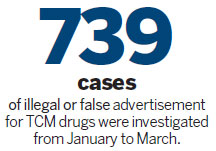TCM seeks cure for false ads
Updated: 2013-05-10 07:04
By Shan Juan (China Daily)
|
||||||||

Patients' health at risk from illegal advertisements
Time-honored traditional Chinese medicine and related medical services have been hit hard by false or illegal advisements, according to the country's top TCM authorities.
Ma Ying, director of the department of policies, regulations and supervision of the State Administration of Traditional Chinese Medicine, revealed at a news conference on Thursday that they had detected more than 9,900 such misleading advertisements by the end of 2012.
The department is mainly responsible for keeping TCM medical services in order, as well as overseeing and guiding the assessment of medical advertisements on TCM.
Starting in 2008, the department launched a surveillance network targeting TCM-related advertisements in the mass media.
"Related medical institutions caught with improper media hype or even false advertisements would be made public and punished," Ma said.
"Such practices seriously affect patients' rights to quality TCM services."
By the end of 2012, some 534 TCM medical institutions had been warned and fined, and 324 suspended from practice. Another 13 had their licenses revoked, he said.
"The severe punishment paid off and the false and illegal advertisement in TCM has been decreasing," he noted.
"However, the new trend is that some are circumventing laws and regulations by posing as news reports and public lectures," he pointed out.
Wang Lian, spokesman of the administration, said this avoided regulation by TCM authorities but could still mislead the public.
From January to March, 739 false or illegal advertisements for TCM drugs and medical services were caught by the surveillance network.
"Some 99 percent of them are disguised as forms other than advertisements," he noted.
Ma Ying alerted the public of such practices and vowed to introduce more targeted intervention efforts.
In false and illegal advertisements, the hospital tended to boast of alleged award-winning specialists and special or unique remedies for certain diseases, he added.
According to surveillance results, such false advertisements mainly focused on common chronic diseases like hypertension and diabetes, and severe conditions like cancer, which are difficult to cure.
Notably, the Internet has become a rising outlet for such false TCM promotion, Ma noted.
In response, supervision of TCM-related websites has been strengthened, he said.
Some 670 websites found to have illegal TCM advertisements have been shut down during the first quarter of the year, he noted.
- Experts urge regulations following TCM scandal
- Beijing hosts TCM training program
- TCM remedy sells out in H7N9-affected areas
- Interest in TCM growing globally
- National program to keep TCM healthy
- TCM demand grows globally
- TCM found to be 'poisonous' in HK sells on mainland
- TCM maker urged to boost drug awareness

 Michelle lays roses at site along Berlin Wall
Michelle lays roses at site along Berlin Wall
 Historic space lecture in Tiangong-1 commences
Historic space lecture in Tiangong-1 commences
 'Sopranos' Star James Gandolfini dead at 51
'Sopranos' Star James Gandolfini dead at 51
 UN: Number of refugees hits 18-year high
UN: Number of refugees hits 18-year high
 Slide: Jet exercises from aircraft carrier
Slide: Jet exercises from aircraft carrier
 Talks establish fishery hotline
Talks establish fishery hotline
 Foreign buyers eye Chinese drones
Foreign buyers eye Chinese drones
 UN chief hails China's peacekeepers
UN chief hails China's peacekeepers
Most Viewed
Editor's Picks

|

|

|

|

|

|
Today's Top News
Shenzhou X astronaut gives lecture today
US told to reassess duties on Chinese paper
Chinese seek greater share of satellite market
Russia rejects Obama's nuke cut proposal
US immigration bill sees Senate breakthrough
Brazilian cities revoke fare hikes
Moody's warns on China's local govt debt
Air quality in major cities drops in May
US Weekly

|

|







